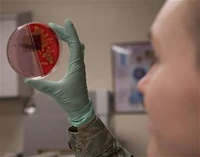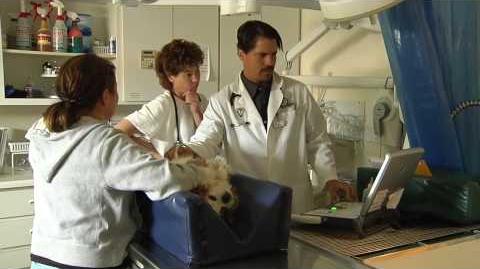Diabetics are particularly prone to urinary tract infections (UTIs) because hyperglycemia [1] causes sugar to spill into the urine, and that sugary urine, while still in the body, becomes friendly to bacterial cultures [2]. Since another symptom of hyperglycemia is excess urination, all the tissues of the urinary tract are being frequently bathed with this sugary bacterial culture. [3][4]
Illness places the body under stress, which can raise blood glucose levels. It also goes to work trying to rid itself of the problem; this causes some hormonal release of some of the same counter-regulatory hormones the body releases when it feels it's being threatened with hypoglycemia. [5] This can make it difficult to keep in good control using the same amount of insulin when there's no illness. Humans with diabetes have "sick day" plans; on those days, more insulin, more blood glucose testing and checking for ketones may be needed.
Urinary tract infections [6] can also cause polydipsia and polyuria.[7]
In addition, a UTI can be a complication to diabetes since infections tend to cause hyperglycemia; hypoglycemia is also possible when dealing with infections. [8][9]
The bacteria can migrate from the bladder to the kidneys causing kidney infection if bladder infections are left untreated. [10][11] The best prevention for this vicious circle is regulating blood glucose as best you can and treating the UTI when it becomes apparent. This is usually done with antibiotics.[12]
Recurring UTIs can often be a sign of poor regulation.

Urine culture-a tool in finding hidden infections.
UTI's can often be hidden [13] (called occult infections) [14], with no clinical signs and normal-looking urinalysis results. [15][12] Urine culture [16][17] may help detect these hidden infections. [18]. Some dogs have chronic urinary tract infections with no evidence of it in their blood glucose levels [19] Long-term steroid use can create a similar situation with the need for urine cultures to diagnose. [20]
Another reason for using a urine culture [21][17] to determine infections is in cases where polyuria is a large factor. Because of it, bacteria and while blood cells may not show up properly as in a normal urinalysis where there's no over-frequent urination. [3] [22] Urine cultures also help in determining the right antibiotic for clearing the infection; knowing which type of bacteria is the cause can help determine which drug or drugs will be more efficient for the job.[23]
Recurring urinary tract infections may be the first 'alert' regarding an underlying disease or condition. The 2003 study link below of 100 dogs who had various recurrent urinary tract infections found that 71 of them had other diseases or conditions which would make them more prone to having UTIs. Those who had their predisposing disorder(s) AND their urinary infections treated were much less likely to suffer recurrences of their urinary problems than those whose UTIs alone were treated. [24][25] It is sometimes advisable for an animal with recurring UTIs to receive a low regular dose of antibiotics to prevent future recurrences.[12] ![]()
Also see infections.
References[]
- ↑ What Makes My Blood Glucose Rise?. Abbott Diabetes UK.
- ↑ Diabetes Mellitus. PetsHealth.
- ↑ 3.0 3.1 Cook, Audrey (2007). Latest Management Recommendations Diabetes-Urinalysis. DVMNews.
- ↑ Daniels, Joshua B., Chew, Dennis J. (2011). Diagnosis and Treatment of Routine and Difficult Urinary Infections in Dogs. Western Veterinary Conference.
- ↑ When You're Sick. American Diabetes Association.
- ↑ Diabetes Mellitus. Petplace.com.
- ↑ Lunn, Katharine F., James Katherine M. (2007). Normal and Abnormal Water Balance: Polyuria and Polydipsia. Compendium.
- ↑ Hypoglycemia in Dogs. Petplace.com.
- ↑ Hypoglycemia. Cornell University.
- ↑ Kirsch M. (1998). Incidence of bacterial cystitis in diabetic dogs and cats at the time of diagnosis. Retrospective study for the period 1990-1996. Tierartzlische Praxis: Ausgabe K Kleintiere/Heimtiere.Abstract in English
- ↑ Brooks, Wendy C.. Urinary Tract Infection-Not So Simple Infections. Veterinary Partner.
- ↑ 12.0 12.1 12.2 Bartges, Joe (2011). Urine Heaven: Of Bugs and Drugs-Urinary Tract Infections. Western Veterinary Conference.
- ↑ McGuire NC, Schulman R, Ridgway MD, Bollero G. (2002). Detection of Occult Urinary Tract Infections in Dogs With Diabetes Mellitus. Journal of the American Animal Hospital Association.
- ↑ Occult UTI and Urine Culture. Antech Diagnostics.
- ↑ Schermerhorn, Thomas (2001). Persistent Hyperglycemia in Dogs and Cats-pages 10-11. Standards of Care-Compendium.
- ↑ Introduction to Urinary System. Merck Veterinary Manual.
- ↑ 17.0 17.1 Brooks, Wendy C.. Urine Cultures. Veterinary Partner. Cite error: Invalid
<ref>tag; name "Brooks" defined multiple times with different content - ↑ Forrester SD, Troy GC, Dalton MN, Huffman JW, Holtzman G. (1999). Retrospective Evaluation of Urinary Tract Infection in 42 Dogs with Hyperadrenocorticism (Cushing's Disease) or Diabetes Mellitus or Both. Journal of Veterinary Internal Medicine.
- ↑ Fleeman, Linda, Rand, Jacqueline (2005). Beyond Insulin Therapy: Achieving Optimal Control in Diabetic Dogs. University of Queensland.
- ↑ Hormonal Therapy. Merck Veterinary Manual.
- ↑ Urine Culture. LabTestsOnline.
- ↑ Cook, Audrey (1 April 2010). Identifying the reasons behind difficult-to-control diabetes in dogs. DVM 360.
- ↑ Gibson, J. S., Morton, J. M., Cobbold, R. N., Sidjabat, H. E., Flippich, L. J., Trott, D. J. (2008). Multidrug-Resistant E. coli and Enterobacter Extraintestinal Infection in 37 Dogs. Journal of Veterinary Internal Medicine.
- ↑ Seguin MA, Vaden SL, Altier C, Stone E, Levine JF. (2003). Persistent Urinary Tract Infections and Reinfections in 100 Dogs (1989-1999). Journal of Veterinary Internal Medicine.
- ↑ Pressler BM, Vaden SL, Lane IF, Cowgill LD, Dye JA. (2003). Candida spp. Urinary Tract Infections in 13 Dogs and Seven Cats: Predisposing Factors, Treatment, and Outcome. Journal of the Americal Animal Hospital Association.
More Information[]
- Retrospective evaluation of urinary tract infection in 42 dogs with hyperadrenocorticism or diabetes mellitus or both Forrester SD, Troy GC, Dalton MN, Huffman JW, Holtzman G., 1999, Journal of Veterinary Internal Medicine
Findings indicate that UTIs are common in dogs with diabetes mellitus, Cushing's disease (hyperadrenocorticism), or both diseases. - Beating Persistent UTIs North American Veterinary Conference-2003
- Recurrent Cystitis in Dogs Petplace.com
- Acute Cystitis in Dogs Petplace.com
- Urinary tract infection in the diabetic patient Zimmerli W., 1984, Schweizerische medicinische Wochenschrift-in English.
Abstract a good thumbnail regarding diabetic pets and UTIs. - Canine Urinary Tract New Hope Animal Hospital. Information about symptoms & treatment of UTI's/Chronic Uti's in both cats and dogs.
- Diabetic Cats & Dogs and Cranberry Juice for Treatment/Prevention of UTIs Dr. Jennifer Fry
- Incidence of Bacterial Cystitis in Diabetic Dogs & Cats at Time of Diagnosis Kirsch M., 1988, Tierarztlische Praxis-Ausgabe K/Kleintiere/Haustiere-In English.
- Management of Urinary Tract Infection Senior, David F. 2005, WSAVA
- Treating UTI's in Cats & Dogs North American Veterinary Conference-2004
- Troubleshooting Persistent Hyperglycemia in Treated Diabetics--Microbial Infection Schermerhorn, Thomas, 2008, WSAVA
- Persistent UTI's--Not the Usual Suspects North American Veterinary Conference
- Inconspicuous UTI In Diabetes North American Veterinary Conference
- Infectious Agents in Urine Cornell University
- Recommendations for Management of Urinary Tract Infection in Dogs Kogika, Márcia Mery, 2009, WSAVA
- Urinary Tract Infections Washington State University
- Changes in Peripheral Lymphocyte Subsets in Diabetic Dogs Treated with Insulin Mori,, Akihiro, et. al., 2007, Japan Veterinary Medical Society
- Urinary Incontinence in the Dog PetsHealth
- Vetsulin-Insulin Requirement Changes in Dogs Intervet
- Vetsulin-Insulin Control-Insulin Resistance Intervet
- Infectious Diseases and the Kidney Goldstein, Richard E., 2010, WSAVA
- Those Stubborn UTIs: Diagnostic and Therapeutic Techniques Wallace, Melissa S., 2001, Atlantic Coast Veterinary Conference



